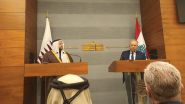The first round of the confidence debate has concluded. On Tuesday, Parliament gathered for a two‐day plenary session, with around 75 parliamentarians set to speak and vote on whether to grant confidence to the new government, known as the “rescue and reform government.”
For the cabinet to commence work, it must secure the confidence of an absolute majority of the MPs present.
Security Crisis and Israeli Withdrawal
After Prime Minister Nawaf Salam presented the decrees for the government’s formation and the ministerial statement approved on February 17, Vice-President of the Chamber Elias Bou Saab took the floor.
While voicing his support for the new cabinet, Bou Saab expressed reservations—particularly regarding the funding sources for Lebanon’s reconstruction following the war between Hezbollah and Israel, a point that has stirred debate among several MPs.
He called for a national dialogue aimed at addressing the country’s sovereignty, defense mechanisms, and the state’s control over weapons to resolve the ongoing political and security crisis.
Lebanese Forces MP Georges Adwan urged the government to set a strict timetable—deadlines not exceeding a few months—for handing over illegal weapons to the authorities.
He stressed that Lebanon must maintain a position of neutrality and implement UN Security Council Resolutions 1701 and 1559 effectively, arguing that true reform and rescue require the state to reclaim control over its entire territory.
Independent MP Abdel Rahman Bizri also emphasized that the withdrawal of Israeli occupation is crucial, highlighting the national security strategy outlined in the ministerial statement.
Although Hezbollah expressed its support for the government, the speech by Hezbollah’s parliamentary bloc leader Mohammad Raad focused mainly on the war with Israel and the group’s “achievements.”
Only toward the end of his address did Raad shift his tone, claiming Hezbollah’s readiness to cooperate with the cabinet.
Reforms and Institutional Recovery
Several MPs underscored the need for urgent reforms and institutional recovery.
MP Neemat Frem expressed hope that the government would address Lebanon’s deep-rooted institutional challenges.
Former FPM MP Alain Aoun stressed the importance of launching reforms to end corruption, while Zahle MP Michel Daher noted that the government should be granted exceptional powers to implement the financial reforms necessary for the country's economic revival.
In contrast, Baalbeck MP Jamil Sayyed criticized the ministerial statement for lacking a clear strategy for executing these reforms.
Zgharta MP Michel Moawad granted his confidence to the government, expressing openness to work with Hezbollah in order to “build a state and a nation for all Lebanese.”
In response to Mohammad Raad’s speech, Moawad firmly rejected the notion of a state controlled by weapons and sectarian delays, and he criticized Hezbollah’s contradictory stance—demanding the deployment of the Lebanese army in southern Lebanon while refusing to hand over its own arms.
2026 Legislative Elections
Regarding the upcoming legislative elections scheduled for May 2026, several parliamentarians stressed their importance.
The Progressive Socialist Party (PSP) pledged its support for the government, with PSP MP Hadi Abou el-Hosn emphasizing the necessity of Israel’s complete withdrawal from all Lebanese territory and calling on the international community to exert pressure accordingly.
On the electoral front, Abou el-Hosn and Vice-President Bou Saab advocated for amending the current law, with MP Yassine Yassine calling for a modern electoral law that breaks sectarian restrictions and recognizes the role of women in political decision-making.
The Lebanese Forces also reaffirmed their support for the cabinet. Becharre MP Sethrida Geagea stated that the implementation of UN Security Council Resolutions 1559 and 1701 would reinforce the state’s exclusive authority over arms and decisions on war and peace.
In an unexpected move, the Free Patriotic Movement (FPM), which has no ministers in the new government, chose not to grant its confidence.
At the close of the day’s session, the immense challenges facing the government were laid bare. As highlighted by several MPs, these include restoring political stability and effectively managing Lebanon’s economic, social, and national sovereignty issues.
Parliament Speaker Nabih Berri then suspended the session, which is set to resume tomorrow at 11 AM.




Comments